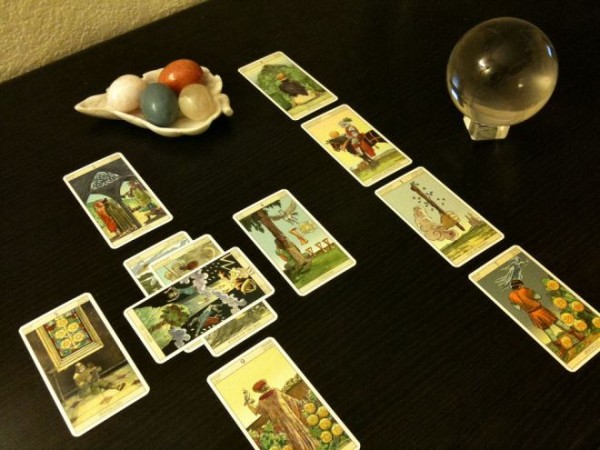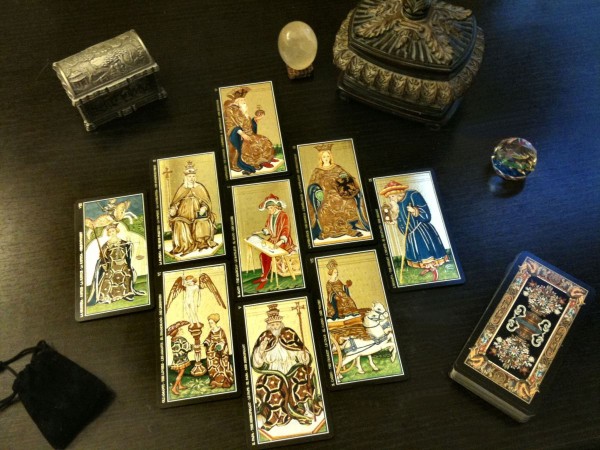
People of color, especially Asians, form associations around their race for every topic– blogging, voting, golfing, farming, realtors, lawyers, doctors, chess players, musicians, journalists, kidney donors, Republicans, Democrats, pole dancing, basketball, you name it, there is probably a group of Asians who have formed an association. Yet there are no Asian American tarot associations, no gatherings of Diasporic Asians who are interested in tarot. Why not?
Let’s back-peddle a bit. What is tarot? Tarot is a deck of 78 cards that started off as a game, much like poker, played by the European elite. It later became adopted by various occult and esoteric secret societies in France and England for use in divination. Some still associate the tarot as a fortunetelling tool of the gypsies. In modern applications, the predictive and fortunetelling aspects of tarot have been removed from the cards for uses in psychoanalysis and psychotherapy. Its popular use, however, is still fortunetelling.
Asians like their fortunetelling, don’t they? So I went searching for Asian tarot readers and tarot enthusiasts.
I spoke with Deedra Wong, a professional tarot reader in California and proprietor of Tarot Perspectives, who estimated that only 30% of her clients were Asian and as for Asian tarot readers, Wong said, “I’m not sure if I have ever met one in my life to be honest!”
She wasn’t kidding. I tried to find Asian tarot readers to interview and it was quite the challenge. Very few seem to have a visible presence. Wong theorized that there simply aren’t enough Asian tarot enthusiasts for the few Asians in the practice to form an association. That’s why there may be Asian group identification among bloggers, voters, golfers, farmers, realtors, and so on, but just not in tarot.
Wong and I joked, “Maybe it’s because all the Asians we know are doctors, lawyers, and engineers.”
I still wasn’t satisfied, though. Asians are no strangers to tarot divination. Streets in Hong Kong and Tokyo are lined with tents where tarot readers wait to reveal the fortunes of curious passersby. Winding back alley streets in Taipei lead to tarot readers who perform readings from their apartments. Tarot is prevalent in India among its practitioners of the metaphysical sciences. Joanna Ash, a professional tarot reader in Singapore and proprietor of Sun Goddess Tarot, acknowledges that many people in her country read tarot and there is a core network of professional Asian tarot readers who she can meet regularly with. Jolin Tsai has featured tarot in her music videos, which suggests that the practice is at least prominent in Asian pop culture.
There are even Diasporic Asian tarot deck creators. Dreaming Way Tarot is a modern re-interpretation of the traditional tarot deck conceived by Rome Choi and Kwon Shina. Zach Wong, a Malaysian-Australian, authored the Revelations Tarot. Robert Wang is considered one of the renown experts in tarot psychology and tarot and the Qabalah.
Why, then, has there been no recognizable sub-group of Diasporic Asians in tarot the way Asians passionate about any other interest, art, science, sport, or politics like to be recognized? Why has tarot remained invisible among Asian Americans and why has the Asian American identity remained invisible in tarot?
Zach Wong, like Deedra Wong (no relation), also hasn’t encountered many other Asians who read tarot. He surmises that it may be because Asians already have many centuries-old divination tools at their disposal, so perhaps there just isn’t any need to borrow from the West on this front.
Plus, he says, he generally keeps to himself, regardless of race. I have found that lifestyle choice to be more prominent overall among tarot readers of any background. Something about the loners seem more drawn to tarot.

Yet the fact is there are tarot-interest institutions such as the American Tarot Association, the Aussie-based Association for Tarot Studies, the Tarot Guild of Australia, and the UK Tarot Association of the British Isles, to name only a few. So the greater community of tarot readers aren’t just keeping to themselves. Why are the Asians? The locales that these associations are based in all have a core Diasporic Asian presence. There certainly are Asians in these associations, but these Asians don’t actively seek out one another. Perhaps the more pertinent question is: are there no Asian activists in tarot?
When I spoke with Joanna Ash, herself a rising star in tarot studies who has contributed a great deal of her own thoughts and writings on tarot, she felt that race doesn’t matter in tarot. “Tarot in itself is a universal language that cuts through race and cultural barriers.” She sees no need for Asians to differentiate themselves and identify under a separate Asian tarot association within the greater tarot association umbrella.
Now granted I spoke to, like, five Asian tarot readers, I did find it interesting that all five said that race doesn’t matter and doesn’t need to be emphasized. They see no problems with the few individual Asian tarot readers who exist to assimilate into the greater tarot associations at large rather than group-identifying with Asians only.
“That’s because only white-washed Asians do tarot,” said one of my friends. “Asian Americans who are anchored solidly in the Asian American community aren’t into that kind of stuff. If they were, there’d be an Asian American tarot group like the one you’re asking about. The absence of such an Asian American tarot group is your proof that activist Asian Americans aren’t into it.”
Hmm, okay, there’s some inventive logic. Nevertheless I’d still like to dispel that notion by calling out to 8A readers. Seriously. Have you had any experiences with the tarot? With Asians who practice tarot? And why the heck isn’t there an Asian American tarot association?
=====
My gratitude to the following:
- Deedra Wong, Tarot Perspectives
- Joanna Ash, Sun Goddess Tarot
- Zach Wong, Revelations Tarot
Photo Credit: Benebell Wen.








